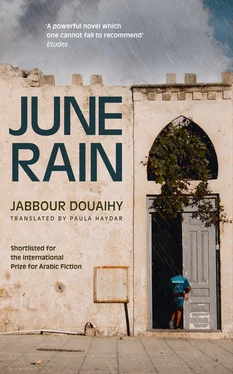‘Why don’t they pay their respects tomorrow or the next day? There’s lots of time…’ Muntaha, half-asleep, asked only that one question.
‘They have to come tonight!’
‘Two men from the Rami family visiting the quarter tonight? Kamileh is totally distraught. What will she say to them? Wait until morning to see how God’s going to get us out of this mess!’
‘Tonight, Muntaha. We cannot put it off.’
The camel has one idea in his head and the camel driver has another.
God help her.
She dragged herself up from the bench. Neither her mother nor her mute relative was around. No one was checking on anyone that night.
She walked, somewhat afraid. Not many big things happened in her life. Had it not been for the fatigue and sleepiness she would have got a bit more excited. She would have to walk in front of them and clear the road for them.
The streets were deserted. Her heart pounded hard all the way to their quarter. She found them sitting at the entrance to the house, silently smoking cigarettes one after another, stamping them out under foot at the half-way point. They were waiting for her.
She knew them well. Kamileh was always pushing the idea that Muntaha should marry Butros al-Rami, the heavier and older one who was sitting to the right. If he paused from puffing cigarette smoke, he puffed the air as he exhaled.
They were sitting on wicker chairs.
‘What are people saying in your quarter?’
She didn’t know how to answer. She in turn asked them about their dead and how the funeral had gone.
She didn’t answer their question, and they didn’t answer hers.
One of them repeated the question. People said whatever they felt like. In any case, she wasn’t going to tell them anything. After thinking hard and carefully she said, ‘What do you want them to say? They’re hoarse from so much wailing.’
‘What are they saying about us, my brother Fuad and me?’
That was the real point of their question. They knew what was being said about them. News travelled fast, especially bad news.
‘I haven’t heard anyone mention you… I was busy with Kamileh the whole time.’
‘Poor Kamileh…’
They knew Muntaha would walk ahead of them.
It was a short road and a difficult one.
She walked ahead of them with her heart pounding. She could hear it the whole way. And the whole way, too, they remained silent, but she noticed each of them was carrying a gun. The metal glinted in their hands.
There had been three of them sitting at a table at the Brazilian Café in Tripoli, as was their custom — the two brothers and Yusef al-Kfoury, when the arms dealer joined them. He told them about a cache of revolvers he had just netted. They bought him a cup of coffee and exchanged bits of conversation and then ordered three revolvers. He delivered them the next day. He brought them in a sack to the same coffee shop. They found a secluded corner and looked them over. Yusef al-Kfoury chose the 14-caliber Herstel. Butros al-Rami paid for the guns and refused to let Yusef al-Kfoury pay him back. A gift, he told him. They didn’t keep track of debts with each other. Yusef al-Kfoury said things weren’t going to stay this way very long and that he didn’t like guns.
No one stopped them on the way, and they didn’t run into anyone.
At every fork in the road and at every opening in the narrow streets the two brothers slowed down. They drew their weapons just in case, listened carefully, and continued walking.
The last calm night.
The night of Monday, 18 June 1957.
Just before noon on that very day, at perhaps the exact hour of night when the time difference was taken into account, one of the town’s émigrés was crowning a long life of struggle by putting his signature on the establishment of a bank in Caracas which he named after the Orinoco River. He had wanted to name it ‘Banco de Libano’ but was told the local population wouldn’t find it appealing. In attendance at the signing ceremony were the Minister of Tourism, Rafael Pikabia, the Minister of the Economy, and a crowd of Venezuelan journalists and media people. The émigré and the members of his family, his wife and two daughters, held 45 % of the bank’s shares; this after many long years of labour and fatigue. He had started out as a travelling shirt merchant and then opened a clothing shop and then a factory, which enabled him to accumulate enough capital to open a bank. He told his children he wished to be buried in his hometown, but they weren’t able to transport him to Lebanon because the day he died in a Caracas hospital the fighting in his town was at its heaviest.
On that night, the families and relatives of the dead went to sleep in an attempt to gather up their strength. They slept but they didn’t eat. The men turned their backs to the women. The men recovered their strength while the women revived their ability to wail and mourn some more and incite the men.
And the next day, or possibly the next night, they would begin.
Kamileh was out on the balcony with only her mother, who had politely dismissed the neighbours. She thanked them and wished them long lives and prayed that their children would be spared from harm. And she told them Kamileh would die if she didn’t get some sleep. She also added that they hadn’t any tears left to cry.
Muntaha came in first, signalling that they were behind her.
‘Get up, Kamileh,’ her mother said in a tone filled with anguish. ‘Yusef’s friends are here!’
Kamileh sat up. From the time the news about her husband had arrived, that was the first movement she made of her own accord. She didn’t say a word.
They didn’t greet her with a handshake.
The two brothers sat silently looking at Kamileh while she looked back at them. They were all scrutinising each other. They had come all the way from the Lower Quarter just to look at her. They had wanted to attend the funeral, but hadn’t dared.
Butros broke into tears first, then Fuad. Butros wiped his tears with a handkerchief he pulled out of his jacket pocket. He blew his nose a long time. He blew it long and hard. He seemed to be searching inside his nose for some way to stop crying.
Kamileh’s mother looked around for fear the neighbours would hear all the nose-blowing.
Kamileh was content just looking into their eyes, asking them for answers they didn’t have.
The resemblance between the brothers was quite apparent — the way their backs inclined as they sat, the width of their noses, the little red splotches on their cheeks, the early signs of a receding hairline and the hairs sticking out of their ears. Fuad was the younger brother, but the differences had faded over time and the two looked like they could be twins.
The silent gathering continued. It went on for a long time, as if no one was going to speak because visits for condolences weren’t occasions for speaking.
It was Muntaha who finally said something. She stood up and excused herself to go home, claiming her mother would be worried about her. Kamileh laughed and then tried to cry but couldn’t.
Muntaha suddenly felt she had no place there. No one was looking at her.
‘Wait a little, Muntaha. Finish the favour.’ Kamileh’s mother wanted her to show them home. At least she could take them through the Lower Quarter. She could take them as far as the school and come back.
It was completely silent; just night sounds could be heard — some jackals in the distance letting out intermittent howls, a gunshot in a neighbouring town and the chirping of crickets in the grapevine.
Suddenly Kamileh started to shiver uncontrollably. Her teeth chattered.
‘It’s a fever-chill!’ her mother proclaimed. ‘We must get her inside.’
Kamileh didn’t want to go inside. Her head moved and a rattle came out of her throat.
Читать дальше












